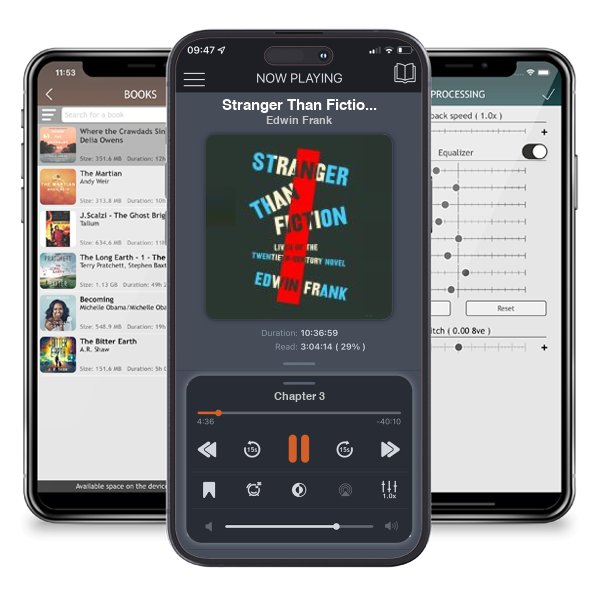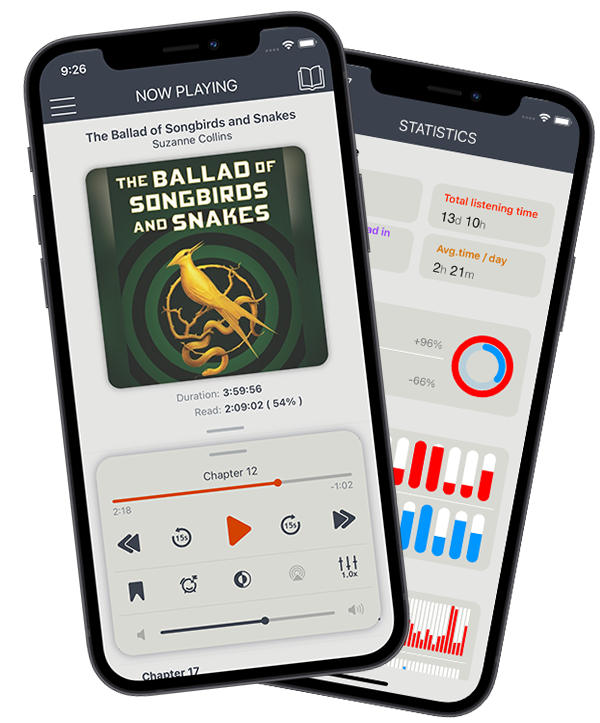Audiobook Stranger Than Fiction Lives of the Twentieth Century Novel by Edwin Frank in the ListenBook app
Want to listen to the audiobook Stranger Than Fiction Lives of the Twentieth Century Novel written by Edwin Frank
ListenBook is here to help!
In ListenBook you can listen Stranger Than Fiction Lives of the Twentieth Century Novel and any other audiobooks you download from the internet.
ListenBook is the easiest and most convenient app for listening to audiobooks
in MP3, MP4, OPUS, OGG, FLAC, AWB, M4B, M4A, WMA, AAC formats
on your iPhone, iPod Touch or iPad!

Book description
A legendary editor's reckoning with the twentieth-century novel and the urgent messages it sends. "How can we live differently?" a young woman urgently demands in Virginia Woolf's novel The Years. The scene is set in the 1930s, war and death are in the air, but the question was asked again and again in the course of a century when things changed fast and changed all the time. The century brought world wars, revolutions, automobiles, movies, and the internet, votes for women, death camps. The century brought questions. Novelists in the twentieth century had a question of their own: how can we write a novel as startling and unforeseen as the world we live in? Again and again they did, transforming the novel as the century remade the world. Imagine the history of the twentieth-century novel recounted with the urgency and intimacy of a novel. That's what Edwin Frank, the legendary editor who has run the New York Review Books publishing imprint since its inception, does in Stranger than Fiction. With penetrating insight and originality, Frank introduces us to books, some famous, some little-known, from the whole course of the century and from around the world. Starting with Dostoevsky's Notes from Underground of 1864, Frank shows how its twitchy, self-undermining, and never-satisfied narrator established a voice that would echo through the coming century. He illuminates the political vision of H.G. Wells's science fiction, Colette and Andre Gide's subversions of traditional gender roles, and Gertrude Stein's untethering of the American sentence. He describes the monumental ambition of books such as Mrs. Dalloway, The Magic Mountain and The Man Without Qualities to rebuild a world of human possibility upon the ruins of World War I and explores how Japan's Natsume Soseki and Nigeria's Chinua Achebe broke open European models to reflect their own, distinct histories and experience. Here too are Vasily Grossman, Anna Banti, and Elsa Morante reckoning in specific ways with the traumas of World War II, while later chapters range from Marguerite Yourcenar and V. S. Naipaul to Gabriel Garc a Marquez and W.G. Sebald. The story as a whole is one of fearless, often reckless exploration, as well as unfathomable desolation. Throughout, we discover the power of the novel to reinvent itself, to find a way for itself, to live differently. Stranger than Fiction offers a new vision of the history and art of the novel and of a dark and dazzling time in whose light and shadow we still stand.SynopsisA Washington Post most anticipated fall bookA legendary editor's reckoning with the twentieth-century novel and the urgent messages it sends. "How can we live differently?" a young woman urgently demands in Virginia Woolf's novel The Years. It is the 1930s, war and death are in the air, but her question was asked again and again in the course of a century where things changed fast and changed all the time. The century brought world wars, revolutions, automobiles, movies, and the internet, votes for women, death camps. The century brought questions. Novelists in the twentieth century had a question of their own: how can we write a novel as startling and unforeseen as the world we live in? Again and again they did, transforming the novel as the century remade the world. Imagine the history of the twentieth-century novel recounted with the urgency and intimacy of a novel. That's what Edwin Frank, the legendary editor who has run the New York Review Books publishing imprint since its inception, does in Stranger than Fiction. With penetrating insight and originality, Frank introduces us to books, some famous, some little-known, from the whole course of the century and from around the world. Starting with Dostoevsky's Notes from Underground of 1864, Frank shows how its twitchy, self-undermining, and never-satisfied narrator established a voice that would echo through the coming century. He illuminates the political vision of H.G. Wells's science fiction, Colette and Andre Gide's subversions of traditional gender roles, and Gertrude Stein's untethering of the American sentence. He describes the monumental ambition of books such as Mrs. Dalloway, The Magic Mountain and The Man Without Qualities to rebuild a world of human possibility upon the ruins of World War I and explores how Japan's Natsume Sōseki and Nigeria's Chinua Achebe broke open European models to reflect their own, distinct histories and experience. Here too are Vasily Grossman, Anna Banti, and Elsa Morante reckoning in specific ways with the traumas of World War II, while later chapters range from Marguerite Yourcenar and V. S. Naipaul to Gabriel Garc a Marquez and W.G. Sebald. The story as a whole is one of fearless, often reckless exploration, as well as unfathomable desolation. Throughout, we discover the power of the novel to reinvent itself, to find a way for itself, to live differently. Stranger than Fiction offers a new vision of the history and art of the novel and of a dark and dazzling time in whose light and shadow we still stand.Synopsis"Convincing, idiosyncratic and often felicitous." --Alexandra Jabobs, The New York Times Book Review "Ambitious, intelligent, and happily unpretentious." --Louis Menand, The New Yorker A Washington Post most anticipated fall bookA legendary editor's reckoning with the twentieth-century novel and the urgent messages it sends. "How can we live differently?" a young woman urgently demands in Virginia Woolf's novel The Years. It is the 1930s, war and death are in the air, but her question was asked again and again in the course of a century where things changed fast and changed all the time. The century brought world wars, revolutions, automobiles, movies, and the internet, votes for women, death camps. The century brought questions. Novelists in the twentieth century had a question of their own: how can we write a novel as startling and unforeseen as the world we live in? Again and again they did, transforming the novel as the century remade the world. Imagine the history of the twentieth-century novel recounted with the urgency and intimacy of a novel. That's what Edwin Frank, the legendary editor who has run the New York Review Books publishing imprint since its inception, does in Stranger than Fiction. With penetrating insight and originality, Frank introduces us to books, some famous, some little-known, from the whole course of the century and from around the world. Starting with Dostoevsky's Notes from Underground of 1864, Frank shows how its twitchy, self-undermining, and never-satisfied narrator established a voice that would echo through the coming century. He illuminates the political vision of H.G. Wells's science fiction, Colette and Andre Gide's subversions of traditional gender roles, and Gertrude Stein's untethering of the American sentence. He describes the monumental ambition of books such as Mrs. Dalloway, The Magic Mountain and The Man Without Qualities to rebuild a world of human possibility upon the ruins of World War I and explores how Japan's Natsume Sōseki and Nigeria's Chinua Achebe broke open European models to reflect their own, distinct histories and experience. Here too are Vasily Grossman, Anna Banti, and Elsa Morante reckoning in specific ways with the traumas of World War II, while later chapters range from Marguerite Yourcenar and V. S. Naipaul to Gabriel Garc a Marquez and W.G. Sebald. The story as a whole is one of fearless, often reckless exploration, as well as unfathomable desolation. Throughout, we discover the power of the novel to reinvent itself, to find a way for itself, to live differently. Stranger than Fiction offers a new vision of the history and art of the novel and of a dark and dazzling time in whose light and shadow we still stand.SynopsisOne of the Washington Post's 50 Best Nonfiction Books of 2024 A New York Times Book Review Editors' Choice "Ambitious, intelligent, and happily unpretentious." --Louis Menand, The New Yorker "Convincing, idiosyncratic and often felicitous." --Alexandra Jabobs, The New York Times Book ReviewA legendary editor's reckoning with the twentieth-century novel and the urgent messages it sends. "How can we live differently?" a young woman urgently demands in Virginia Woolf's novel The Years. It is the 1930s, war and death are in the air, but her question was asked again and again in the course of a century where things changed fast and changed all the time. The century brought world wars, revolutions, automobiles, movies, and the internet, votes for women, death camps. The century brought questions. Novelists in the twentieth century had a question of their own: how can we write a novel as startling and unforeseen as the world we live in? Again and again they did, transforming the novel as the century remade the world. Imagine the history of the twentieth-century novel recounted with the urgency and intimacy of a novel. That's what Edwin Frank, the legendary editor who has run the New York Review Books publishing imprint since its inception, does in Stranger than Fiction. With penetrating insight and originality, Frank introduces us to books, some famous, some little-known, from the whole course of the century and from around the world. Starting with Dostoevsky's Notes from Underground of 1864, Frank shows how its twitchy, self-undermining, and never-satisfied narrator established a voice that would echo through the coming century. He illuminates the political vision of H.G. Wells's science fiction, Colette and Andre Gide's subversions of traditional gender roles, and Gertrude Stein's untethering of the American sentence. He describes the monumental ambition of books such as Mrs. Dalloway, The Magic Mountain and The Man Without Qualities to rebuild a world of human possibility upon the ruins of World War I and explores how Japan's Natsume Sōseki and Nigeria's Chinua Achebe broke open European models to reflect their own, distinct histories and experience. Here too are Vasily Grossman, Anna Banti, and Elsa Morante reckoning in specific ways with the traumas of World War II, while later chapters range from Marguerite Yourcenar and V. S. Naipaul to Gabriel Garc a Marquez and W.G. Sebald. The story as a whole is one of fearless, often reckless exploration, as well as unfathomable desolation. Throughout, we discover the power of the novel to reinvent itself, to find a way for itself, to live differently. Stranger than Fiction offers a new vision of the history and art of the novel and of a dark and dazzling time in whose light and shadow we still stand.
Hang 11
ListenBook's support for playlists in CUE format is a detail-oriented touch I truly appreciate. This app's sleek design and intuitive navigation have made audiobook listening a seamless experience. 🎉 The ease and functionality of this app make it my go-to choice for immersive audiobook experiences. 📱🎧 Sharing audiobooks through AirDrop is a great way to spread the joy of storytelling with friends. I’m so impressed with ListenBook. The app is reliable, fast, and packed with features like customizable themes and playback speed. The sleep timer is a lifesaver for bedtime listening. Highly recommend this app!
WanderWord
📱 An entire library at my fingertips – this app is a book lover's dream come true! 📚🌟 Kudos to the developers for creating an app that caters to audiobook lovers like me. From sleek design to functional features, it's a true gem. 💎📚 Binaural audio processing really works. Less fatigue during long listening sessions.
Purity
I'm amazed at how this app has made my daily routines more enjoyable and intellectually stimulating. With this app, I'm discovering the joy of reading during my commutes. 📱 Audiobooks at my fingertips – this app's ease of use is a booklover's dream come true! 📚🔥 🌌 Igniting my imagination while preparing dinner – this app adds flavor to every meal! 🍲📖 I've found my new favorite narrator! Their voice was perfectly suited to this material, with just the right blend of authority and approachability. The production quality was broadcast-level - no distracting breaths, clicks, or inconsistent volume. Already looking for more of their work.
Achilles Mountain
I appreciate the option to listen to samples before committing to a book. ListenBook's support for CarPlay and Apple Watch integration has elevated my listening experience. ListenBook Pro's tone adjustment feature is fascinating. I can alter the reader's voice to match my mood—what a creative addition! The ability to organize my library is a huge plus. Everything is so neat and tidy.
Knock Out Star
Effortlessly immersing in stories – this app's ease of use is a game-changer. User-friendly audiobook experience – this app's design is a standout.
Taffy Duchess
ListenBook's seamless integration with CarPlay enhances my daily commute, making it a productive and enjoyable experience. This app's customizable features, like playback speed and bookmarks, have transformed my experience. I'm hooked on this app's ability to transform my ordinary moments into exciting opportunities for learning. The statistics feature in ListenBook adds an element of self-awareness to my audiobook consumption.
Stud muffin
With this app, I've turned mundane chores into exciting opportunities for intellectual growth. Absolutely in love with this audiobook app! The seamless functionality and easy navigation make my reading time pure bliss. 📚🎧 ListenBook Pro's noise reduction feature has transformed the audio quality. It's crystal clear now.
Pusher
The vast selection of titles on this app is a book lover's dream come true. 🚶♀️📖 Discovering new worlds on my daily walks – this app is my travel companion! 🌍🎧
Sw33per
Listening to books in their original language has improved my foreign language skills. I'm impressed by ListenBook's ability to extract artwork and metadata automatically. I'm blown away by the silky-smooth playback, even for high-quality formats like FLAC. Top-notch performance! I love the ability to change the background color. It’s a nice touch.
Irish Dze
This app has reignited my passion for literature – I'm devouring books like never before. 📱 A world of books at my fingertips – this app's user-friendly design makes it a true reading companion. 📚📱 Sharing audiobooks with friends through AirDrop is such a fun way to spread joy.
Tough Nut
🎶 Forget background music, I've got enchanting stories to accompany my chores! 🎵📚 🎉 Rekindling my love for reading – this app has reintroduced me to the joy of books in a whole new way. 📚🔥 Say goodbye to boring commutes – this app's immersive audio experience and intuitive controls have transformed my daily journeys. 🌟📚 ListenBook's support for playlists in the CUE format makes organizing and enjoying audiobook series a delightful experience. Automatic artwork and metadata extraction keep my audiobook library organized and visually appealing.
21st Street
With ListenBook, I've found a way to make the most of my free time while indulging in my love for audiobooks. The statistics feature in ListenBook provides valuable insights into my audiobook consumption habits. Sharing books with friends via AirDrop is so convenient. Thanks, ListenBook! Adjustable playback speed and volume controls are fantastic features. I’d listen to this narrator read anything! Their voice was so expressive and fitting for the material. The story itself was great, but the narration took it to the next level. Definitely a 5-star experience.
Marshmallow Treat
ListenBook's compatibility with CarPlay and Apple Watch makes it a versatile companion for my daily activities. ListenBook's compatibility with CarPlay and Apple Watch, combined with its chapters, controls, and filters, make it the ultimate audiobook app! Gone are the days of struggling with formats. Thanks to this app, my audiobook journey is a breeze, and every tale is a tap away. Highly recommended! 📚🎧 Noise reduction and voice tone adjustment enhance the listening experience significantly.
Gentle Avenger
I appreciate how ListenBook offers various methods for downloading audio – it caters to different preferences. Thanks to ListenBook's extensive statistics, I can track my audiobook consumption and celebrate my progress. No more hassle with formats – this app ensures my audiobook adventures are smooth, and my favorite tales are just a tap away. Highly recommended! 📚🎧 ListenBook's commitment to a seamless user experience is evident in its sleek design and intuitive controls.
Take Away
ListenBook has redefined my audiobook journey, making it more enjoyable and convenient than ever before. ListenBook's seamless integration with CarPlay enhances my daily commute, making it a productive and enjoyable experience. Kudos to the developers for creating an app that caters to audiobook lovers like me. From sleek design to functional features, it's a true gem. 💎📚 ListenBook Pro's noise reduction is a lifesaver. I can hear clearly even in noisy environments. The app's compatibility with CarPlay is a dream for road trips. It keeps me entertained.
Queen Ginger
I've found my new favorite way to relax – cuddled up with an audiobook. No more hassle with converting files – ListenBook supports a wide range of formats for a seamless listening experience. The compatibility with Apple Watch is a huge plus. I can control my audiobooks from my wrist! Love how I can adjust playback speed and audio volume. ListenBook caters to all my needs. ListenBook is the ultimate audiobook player. The app supports all formats, and the import process is seamless. I love the playback history feature—it’s so easy to revisit my favorite parts. Highly recommend this app!
Sky Dahlia
ListenBook Pro offers amazing value with unlimited audiobook length and noise reduction features. The playback speed adjustment is a game-changer for busy individuals. Time saver! ListenBook’s interface is beautiful and functional. It’s my favorite app for audiobooks.
Mum Mary
I can't believe how much time I've saved thanks to this efficient app! I'm hooked on this app's sleek design and seamless performance – it's a must-have for any reader. Audiobook enthusiasts, rejoice! This app's thoughtful features, such as auto-rewind and chapter navigation, cater perfectly to our storytelling cravings. 🎉📚 This app is a must-have for anyone who loves audiobooks. The interface is intuitive, and the app supports all formats. I love the auto-bookmark feature—it saves my place automatically, so I never lose track. Highly recommend!
MysticMingle
I love how this app's user-friendly interface allows me to navigate through chapters and controls effortlessly. Finally, an app that respects my busy lifestyle. Whether I'm commuting or exercising, this app's smooth playback and smart controls keep me engaged. 🏃♀️🎧 Finally, an app that supports a wide range of audio formats! It's a must-have for audiobook enthusiasts. ListenBook has become my go-to app for exploring a diverse range of audiobooks. It offers a wide array of features that cater to different preferences and needs. I love the auto-rewind feature. It’s great for when I zone out.
Manly
🚗📖 Road trips have never been this entertaining – this app keeps me engaged on the highway! 🚙🎉 ListenBook Pro's noise reduction feature has transformed the audio quality. It's crystal clear now. The ability to download audio directly within the app is a lifesaver. ListenBook is incredibly convenient.
Trusted by over 100,000 users across the globe
What is ListenBook?
Why ListenBook?
How does it work?
1
Download audiobooks from any site in any of the supported formats.
2
Add audiobooks to the app using any of the many download methods available.
3
Listen to audiobooks by controlling playback from your phone, headphones, Apple Watch or CarPlay.
Playing a wide variety of audio formats
Works on all devices with iOS 13 and newer
Huge amount of features for a small price
Frequent updates to add new features and improve existing ones
Advanced playback controls
Live sound processing
Changing the timbre of the reader's voice and noise reduction
Translated into more than 20 languages
App for those who love audiobooks
ListenBook has the features you need no matter what you are listening to
Listening to fiction
If you love listening to fiction audiobooks, ListenBook has features to make the process easier.
Edit book data: title, author, cover
Use equalizer to make the sound comfortable for you
Adjust the playback speed
Enjoy dark and light app themes
Supported formats: MP3, M4B, AWB, FLAC, OGG audio files and many more (must be DRM free)
Auto-Bookmarks make it easy to find your place
AirPlay support allows redirection of audio output.
VoiceOver support
Dark mode for night owls

Listening to audio lectures
Convenient bookmarking system helps you mark the most important places.
Unlimited bookmarks for each audiobook
Put your own cover on the wager
Share your audiobook with friends
Lock-screen control
Customise app with extensive options
Sleep timer with shake to reset, set custom notification sounds, and a few unique options
Auto rewind depending on paused time, customize rewind times to your liking
Removing background noise from recordings made in classrooms and meetings
Changing the timbre of the reader's voice for a better listening experience





